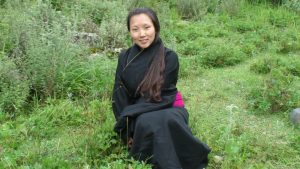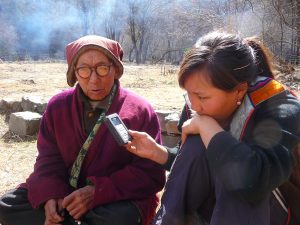2017 December
Student Spotlight: Yu Lha (གཡུ་ལྷ།)
Today we hear from Yu Lha, a current undergraduate student who is working on completing a B.A. in linguistics.
In the introduction to your book, you mention the different names that you have gone by: G.yu Lha; Yi Na; Yina; Jody; Yu Lha. Can you speak a bit about that? What are the naming conventions that led to each of those?
I have many names and people know me by different names. My birth name given by my family is Yu Lha (གཡུ་ལྷ།) which means turquois goddess in Tibetan. G.yu Lha is a transliteration of Tibetan letters into the Roman alphabet. When you register a newborn with the Chinese government. to get an ID, they will give you a Chinese version of your Tibetan name. This is why I have Yi Na as my Chinese name that became my name on legal documents. I also had an English name, Jody, when I studied English in western China. Of all my names, I prefer to be called by the name my family call me, Yu Lha.
Now I’ll back up a bit. You wrote book! In high school. That is quite an accomplishment. Can you share more about that, and how that has informed your undergraduate work?
My work with my own community about oral traditions and cultures allowed me to look closely at my roots. I had never thought about the history and stories that people tell about how the village came to be as one of the members in the community. When I started writing Warming Your Hands With Moonlight, a book about oral traditions in my village, that published in 2011, I questioned myself about my ability to produce something like a book at age 19. The constant encouragement from my family, friends, and my English teachers at the time made me determined I have the responsibility and capability to document my undocumented mother tongue – Khroskyabs. This ultimately fueled my inner passion and thirst to peruse a higher education in US.
What is your favorite proverb, or one that you find yourself using often?
My favorite proverbs is still the title of my book: warming your hands with moonlight, which is a polite way to refuse people the first time. This reminds me to be humble, not over proud of what you already know because there is much more to learn.
 You recently did a presentation of your ongoing work at Reed College. How was that experience?
You recently did a presentation of your ongoing work at Reed College. How was that experience?
I was amazed by how many people showed up at the presentation since no one had even heard about the Khroskyabs language. I enjoy sharing my stories about language documentation and revitalization with a wider audience. Each time, I learn something new from the audience.
You will be graduating in the Spring. What’s next?
My honor’s thesis at will be a linguistic description of how space is encoded in Khroskyabs language. I dream to preserve my people’s customs, culture and language by creating a system to capture Khroskyabs in written form.
Yu Lha and her work was featured in the University of Oregon’s College of Arts and Science’s publication: https://cascade.uoregon.edu/spring2015/features/native-speaker/